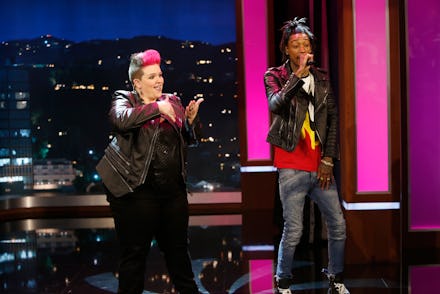This Is What It's Like Listening to Music As a Deaf Person

Anyone who thinks American Sign Language isn't hip-hop needs only to look at the videos of ASL interpreter and performer Amber Galloway Gallego. She turned A$AP Rocky and Kendrick Lamar's "Fuckin' Problems" into a fist-thrusting anthem at Lollapalooza 2013; she took Eminem's "Rap God" and translated his dense, record-breaking rhyme patterns into a complex flurry of hand signs.
Her videos and other sign language interpreters performances have gone viral again and again, and each video Gallego and others feature in draws attention to an oft-over looked fact: Many deaf and hard-of-hearing people enjoy music just as much as hearing people. It often only takes someone with unique skills like Gallego's — and a venue willing to pay for them — to complete the experience.
Unfortunately, too few do.
"There are a lot of people who are guitarists, but can everyone play like Slash?" Gallego asked in a Skype interview Friday. "It's the same thing in our field. Just because a person might have a certification doesn't mean that they can deliver music."
It's something venues generally skimp on first, believing that there really isn't enough of a demand for music among the deaf community. But this couldn't be further from the truth, and this misunderstanding leaves too many isolated from musical experience.
Music is not only a hearing person's game. It's impossible to summarize the deaf community's relationship with music with any sort of catch-all declaration of love.
"It varies for all of us, just like it does for hearing people," JoAnn Benfield, deaf performer, shared in an email conversation. "I love the feeling of the bass and how the vocals tickle my eardrums as well — especially when I crank up the volume. If I weren't deaf, and had an amazing voice, I would probably be a singer/performer, because music — to me — is pure emotion shared effortlessly."
That emotion can be communicated through swagger of a performer or the sway of the crowd or through vibrations, which many deaf listeners have also found ways to amplify.
"It's far more than just the audio signal coming out of the amplifiers," Jacob Adams, research and campaigns manager for Attitude Is Everything, a UK-based accessibility initiative. "We were in touch with some deaf people the other day going to see Bruce Springsteen. They make use of some very basic DIY things to be able to pick up the vibrations more. Some people would chose to have balloons and hold to them to their chest, just to intensify the sensory experience of the vibrations."
These vibrations are actually music for deaf individuals. A study out of the University of Rochester School of Medicine in New York showed that the developing brains of many deaf individuals appropriate portions of the brain normally reserved for auditory processing to respond to physical vibrations. The same cortex realignment may occur with visual stimuli.
"We do know through brain imaging that someone who has grown up without access to sound, the parts of the brain that would usually light up to sound are maybe lighting up to visual stimulation instead," audiologist Jane Brew told the Australian Broadcasting Corporation in April.
It makes the job that Gallego and Benfield do that much more important. However, attempting to communicate this importance to venues asking them to set aside resources to hire interpreters is a hell of an uphill battle.
"Deaf people and hard-of-hearing people have to fight for their basic human rights of communication every day — just to go to the doctor, to go to meetings — they're constantly fighting for communication," Gallego explained. "So whenever you want to break away from the hardships of life, we want to escape to another world, that's why we go into these venues. But deaf people have to fight sometimes two months in advance to try to get an interpreter."
Often venues refuse to honor the interpreter requests of their fans, or delay their addressing accessibility concerns until performers are running up against show time, making preparation an extremely stressful experience. Outside of the live experience, many artists refuse to subtitle performance DVDs or performances, making it essentially impossible for deaf fans to access those musical moments.
"If all these people would take a minute to realize how tough life is without music access, and the problems with live music and with DVDs, and asked us what we wanted to see happen, progress might be made," Paddy Ladd, deaf author of Understanding Deaf Culture, co-founder of the Deaf Zone, which works in the USA and UK to create music access for Deaf people and a signed songwriter, wrote in an email. "What these people see as doing us a a big favor is actually a civil rights issue."
Benfield agreed that attitude and understanding are the first things that need to change. This would encourage festivals to take the necessesary steps to ensure accessibility, such as setting an ample budget for quality interpreters and reserving a "deaf section" where individuals can see the stage and better feel the bass.
"Once this becomes standardized for all festivals/concerts, it will bring in more deaf fans to events, as they will know access will always be provided," she wrote. "We don't ask for much when it comes to music. We just want to be able to enjoy it just like everyone else does."
Read more:
June 8, 2016, 7:21 p.m. Eastern: This story has been updated.